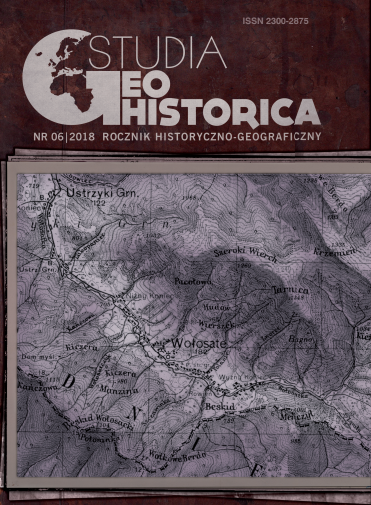Historical Cartography of Confessions and Religions in the Polish-Lithuanian Commonwealth: Between Historical Geography and Spatial History
DOI:
https://doi.org/10.12775/SG.2018.10Słowa kluczowe
Polish-Lithuanian Commonwealth, confessions and religions, historical cartography, historical geography, spatial humanitiesAbstrakt
Historical thematic cartography devoted to confessional or, in yet broader terms, religious problematic enjoys a stable status in Poland. Religious issues have usually been treated in a two-fold way: 1. as the major subject of historical cartography, 2. as a component of historical cartography concerned with socio-cultural or historical-political problematic. The former embraces the tradition of the Centre for Research on (earlier Institute of ) Historical Geography of the Church in Poland (Catholic University of Lublin), whereas the latter – the works of the Historical Atlas of Poland (Institute of History of the Polish Academy of Sciences). Even though the Polish-Lithuanian Commonwealth was a multi-religious and multi-confessional country (including both Christian and non-Christian faiths), the majority of hitherto cartographic studies was predominantly preoccupied with institutions, peoples and religious practices of the Latin Church, which enjoyed a preferential systemic and socio-economic status in the Commonwealth. For decades, Polish historical cartography focused on the reconstruction of territorial structures and multi-level administrative divisions. The meticulousness and methodology of these approaches varied greatly, ranging from small-scale schematic maps of dioceses, to very detailed inventory maps of parochial borders (the “Historical Atlas of Poland” series). Its thematic development Polish cartography of confessions owes to professor Jerzy Kłoczowski who made the geographical- historical method one of the pillars of studies into socio-religious history, strongly influenced by the French “Annales” school. The Centre for Research on Historical Geography of the Church in Poland at the Catholic University of Lublin is the only scientific institution in Poland whose research profile and methodology focus on geography and historical cartography of religions and confessions. The vast cartographic material collected over many decades forestalled a full development of cartographic research methodology and the subsequent evolution from cartographic presentation to analysis and interpretation, which had been advocated by Kłoczowski already in the 1960s. The introduction of innovative technological devices to geographical-historical research, specifically databases and systems of spatial information, have opened anew the discussion on the opportunities for integrating data with methods of their analysis. Through its connection to other layers of the landscape of the past historical geography of confessions and religions is now becoming a crucial element of spatial history. Importantly, its inclusive and interdisciplinary character tallies well with the programme formulated by Le Bras and Kłoczowski, within the framework of which institutions, peoples and religious practices should be presented alongside other elements of social, economic and cultural life. Only this may facilitate a proper assessment and description (both quantitative and qualitative) of religious practices, helping to properly interpret factors which have influenced the development of religious institutions and practices.
Pobrania
Opublikowane
Jak cytować
Numer
Dział
Statystyki
Liczba wyświetleń i pobrań: 562
Liczba cytowań: 0



